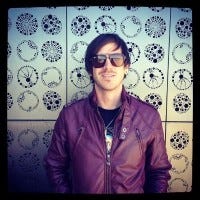
Featured Blog | This community-written post highlights the best of what the game industry has to offer. Read more like it on the Game Developer Blogs.
A Game Dev Story, Part 1 (Crash Course)
Looking back on my first job in the industry and some philosophies formed about what it means to be a Game Developer.

This post was originally published on Ryan Darcey's blog, Making Moves.
In a previous post, I discussed how I made my way into the video game industry with a combination of hard work, dedication & dumb luck. Terminal Reality (TRI) was the company that finally took a chance on me and I'll be forever grateful to them for that. My three years working there in Dallas, TX were some of the most formative with regard to constructing a philosophy around what it means to be a Game Developer. To that end, I'll highlight some key tenets I've incorporated into my work that were born from this experience at TRI.
YOU'RE A GAME DEVELOPER 1ST, DESIGNER/ARTIST/ENGINEER/PRODUCER 2ND

To that end, I think "Game Developer" is a role we all need to own. It's something to embrace as a unifying force, like being human. Maybe there's a better word for it, but it's always been Developer with a capital 'D' to me. During my time working on AAA games with increasingly large teams & specialization, this concept seems to have fallen by the wayside. However, the recent surge of ex-AAA devs in the indie scene tells me the pendulum is swinging back in the other direction.
To sum up, I'd encourage you to work to the edge of your ability, not your official role. And if you have the authority, allow that to happen. Maybe your current company doesn't support it. Maybe your current company isn't right for you. In a single image and at its core, I think Valve's "T- Shaped Employee" model captures the spirit of what I'm trying to relay here.
BEWARE OF ELITIST DEVELOPERS (INCLUDING YOU)

Not only that, but we're also vulnerable to dismissing others outside our discipline from contributing to that area. After all, we've spent years honing our skills. We've got degrees. We've shipped games. WE WERE BORN WITH THIS SKILL! What the hell do they know, anyway?
Some of the best design choices I've implemented were not my own ideas. Alright...let's be honest. A majority of them weren't. I'm cool with that, though. I was able to recognize the designer in other team members and I leaned on them to help curate the best possible experience for the player. Don't get me wrong; this can be difficult and I'm no saint. I've had a lot of fights with my ego in order to keep this essential level of respect for my teammates. I frequently have to put myself in check, and at times others have had to. Just be conscious of these pitfalls. Don't put you or your discipline on a pedestal. Someone will have the power to knock you off of it, so you may as well chill down here with the rest of us and avoid the fall.
DO MAKE FRIENDS, DON'T MAKE ENEMIES

What's that you say? John Doe is a dick? I know...it's not always gonna work. You're gonna find some insufferable assholes out there, and you're gonna be an insufferable asshole to someone else. Just make an effort and maintain a humane level of respect and professionalism when dealing with the people that drive you crazy. Apologize when you inevitably don't. The industry is small.
CRUNCH IS EXCITING. CRUNCH IS MADDENING. CRUNCH IS UNSUSTAINABLE.
As a 21 year old just entering the industry, I was FULL of energy (and caffeine). I would do anything to make a great game. But, not everyone at TRI was like that. Especially some of the veterans. What was the deal?
Crunch. That shit is a killer. To be honest, it was really exciting to me at first, though. Giving myself to a project like that for the first time felt amazing. Like, I had never felt so committed and passionate about something before making games. Of course I'm going to crunch to make sure it's amazing! I clocked 112 hours in one week during my second year at TRI. I wore it like a badge of pride. That is, until I had what I can only assume was a nervous breakdown. Completely drained, dizzy and unable to think straight, I remember having to leave the office one day to realign my mind and body. I think I slept for 24 hours straight. After that, I started ratcheting down my time in the office.
This topic is talked to death and you can find thousands of other developers out there with stories about how fucked up crunch can be. The one thing I don't hear about often, though, is how alluring it can be. Not as the project leader trying to hit a deadline, but down in the trenches trying to hit a quality bar. Especially when you're young. Not only do you have to keep your company in check, but you have to keep yourself in check. Crunch can be extremely rewarding and worth it when it's self-imposed, just know your limits and be careful about trying to be a hero at the expense of your physical and mental health. There are diminishing returns for your game and for your life.
R.I.P. TERMINAL REALITY
Sadly, like so many others, Terminal Reality had to close its doors in December of 2013, but its legacy lives on in all of us who worked there. TRI ushered in some of the most talented Game Developers I've met in the industry. We've gone on to create Call of Duty, Halo, Fallout, World of Warcraft, League of Legends, Borderlands, Uncharted, TitanFall, Destiny & Star Wars games...just to name a few ;) Things weren't all good at TRI, but it was a legend in its own right and I'm proud to have spent my first years of game development working there.
 @Ryan_Darcey
@Ryan_Darcey
Read more about:
Featured BlogsAbout the Author(s)
You May Also Like















